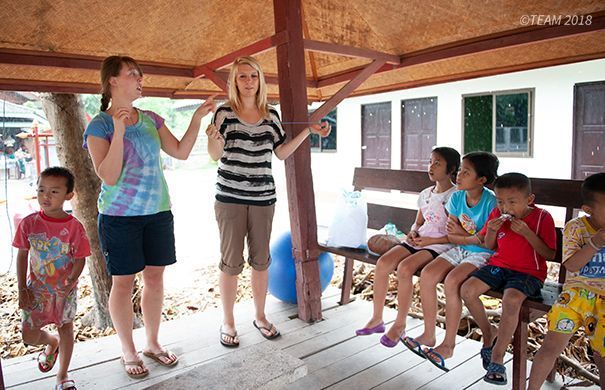Eight years ago, TEAM missionaries in Tokyo leased the site for what would become the SonRise Cafe. The vision was to create a missional coffee shop , where people could feel welcome — and get to hear the Gospel.
But the only structure that stood there was a concrete shell.
They needed pretty much everything, from floors and ceilings to kitchen cabinets. How would they get it all done? Their time was eaten up by other ministries. And then there was the matter of funds. It was impossible for them to accomplish on their own.
That’s when five men from the U.S. and Australia agreed to come for two weeks. They tirelessly volunteered their time and money to the project. And that laid foundations for a long-term ministry that is still running strong today.
SonRise Cafe has birthed a church, an orphanage ministry, a university outreach and a music ministry. Countless people have come to know Christ — all because of one small short-term team and their supporters.
This September, TEAM is celebrating 50 years of short-term missions trips just like this one. And we pray that God will let us send many more short-termers to the field. Will you pray with us for short-term ministries across the globe? Pray that their hard work will impact generations to come.
Sign up here to get the new Prayer Focus in your inbox each month.
1. Pray for good training for short-term missionaries.
No matter how short a missionary’s trip, cultural and ministry preparation is vital for a successful mission. Receiving good preparation for their time abroad helps short-term missionaries feel more relaxed and ready to focus on the tasks ahead.
Some missions agencies have pre-departure training programs. For example, TEAM’s short-term training covers issues like culture stress , relationship building, spiritual warfare, safety , security and many others. However, less formal trips may require missionaries to craft their own preparation plan.
Ask God to guide those who train short-term missionaries so they can give good instruction. Pray that missionaries without training will still find helpful resources. And pray that short-term workers’ hearts will be humble and ready to receive training .
2. Pray for supporters for short-term missionaries.

Whether it’s leading VBS, roofing houses or teaching English, short-term trips are made possible through generous supporters like you!
Supporters equip short-termers to fulfill many needs a long-term missionary can’t meet alone.
Some short-termers create brochures or short films that long-term missionaries can use in fundraising.
Some short-termers host vacation Bible schools or other special events that ultimately assist the long-termers in evangelism and outreach.
Some short-termers teach a specialized subject or course to the locals for a season.
But without the financial and prayerful backing of supporters at home, short-term ministries would not be possible.
Pray that potential supporters will see the value of these short-term missionaries’ efforts. Pray also that short-termers will reach their ministry goals in the limited amount of time they have in the area.
3. Pray that communities will be touched by short-term missionaries.
When successful, short-term ministry has the potential to open doors to whole communities of people. One short-term worker who served in Mexico as an English teacher recently influenced an entire school.
“She was so good at what she did that she opened doors for us,” said Steve Dresselhaus, a long-term missionary with TEAM. “We are now good friends with the school, and we have a new short-termer … on the way down in September to work at the school.”
Pray for the people short-term missionaries minister to. Pray that they will see God’s love through short-term missionaries’ actions. And pray that they will embrace Him .
Thank you for partnering with us in prayer! Click here to get a print-out of this month’s Prayer Focus requests and praise reports.




















